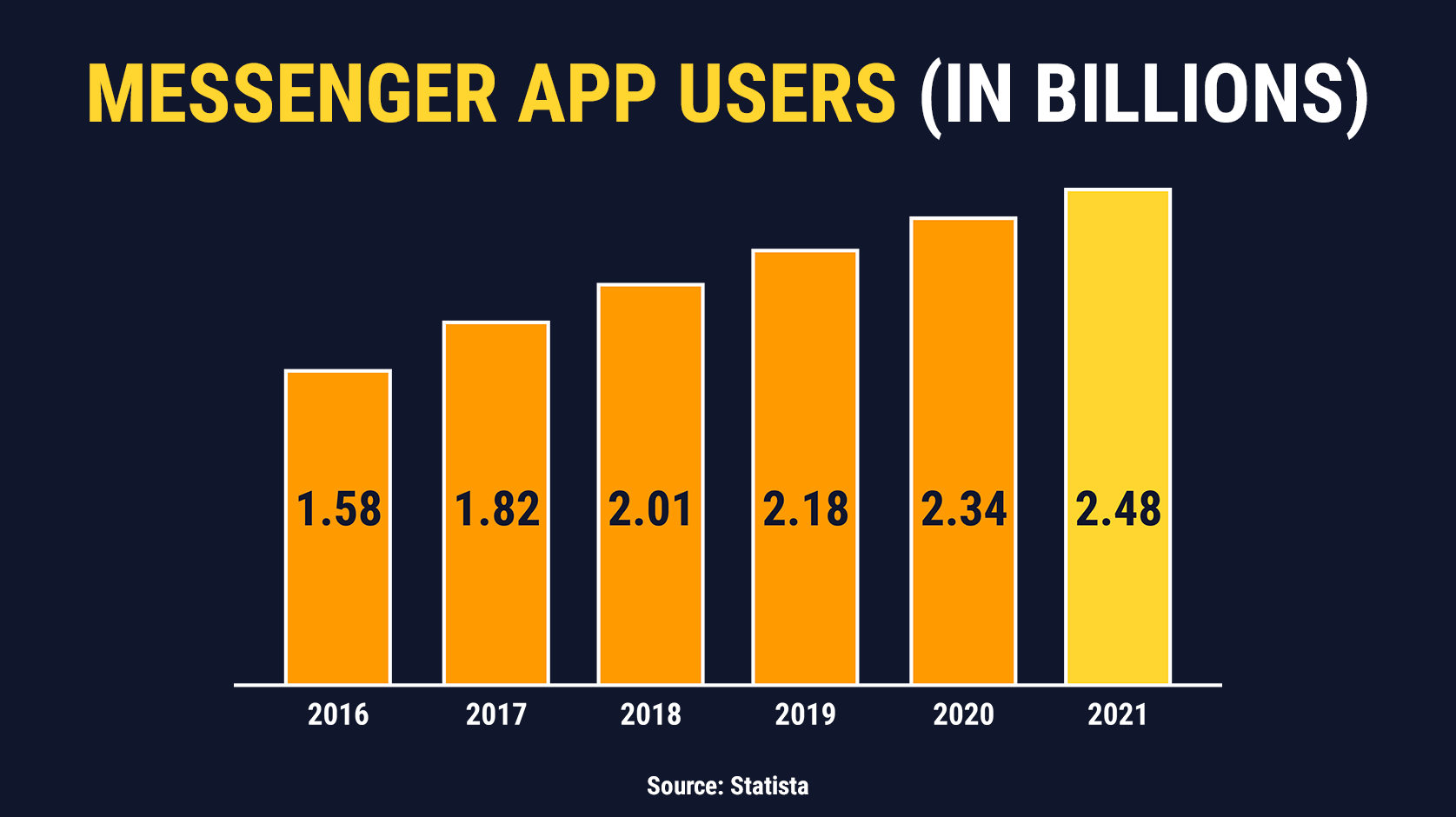The great business icons who have gone down in history have one major thing in common: they’re enormous risk-takers. They don’t give a f*** about coloring inside the lines. They break new ground without permission. Sometimes they fight the system. In the IDGAF interview series, I chat with business people who aren’t afraid to swim against the current or speak against the status quo. Together, we explore the downfalls, reality and hard truths in business today. In this interview, we’re talking about traditional communication — and we’re not holding back.
Decades ago, the rise of phone and email overthrew letters and telegraphs. Shrinking our planet to one global village and flooding the business world with opportunities, they secured their places as the dominant channels of communication.
Now stop and imagine those businesses who dug in their heels against the change and said, “I don’t need a phone — traditional communication methods work just fine.”
Examples like this highlight just how foolish it is to try to resist change. Yet, even today many brands still try to hold onto the past, despite the evidence that the way we communicate is changing. The main question: is traditional communication still effective when it comes to reaching customers?
Today’s conversation is with Julien Rio, the director of marketing at RingCentral Engage Digital and an enthusiastic keynote speaker. According to Julien, we’re at the dawn of another enormous change of communication. People now spend their whole lives (!) in instant messengers exchanging acronyms and emojis, ditching phone calls and email unless it’s a formal or serious conversation.
Before moving back to Paris, Julien spent around ten years of his career working in Hong Kong in digital marketing. At his newest post, Julien has been focusing on customer service, exploring how new technologies are impacting modern companies and their engagements with customers.
I ask Julien why everything—whether it concerns apps, devices or speakers—is becoming conversational, and he instantly replies that “the apparent reason is convenience.” He describes how before the 90s, we only communicated with people who were in the same specific geographical region as us.
With the arrival of the internet, however, our personal networks exploded. “People started to communicate with people,” he continues, “Not necessarily the person on the other side of the street, but now we are able to talk to people on the other side of the earth.” From there, it was a natural progression: as more and more people got their hands on smartphones, it became even easier to communicate with anyone globally.
On the perks of messaging
To clarify how messaging brings about what Julien calls “additional convenience,” he makes a distinction between a phone call and a message. When you call someone, you and the person on the other line both need to have enough time to speak. You also need to ensure a good signal throughout the entire conversation, meaning that you can't head down into the subway or hop on a plane and keep the conversation going.
A conversation through messaging, on the other hand, is incredibly convenient: “I send a message when it's convenient for me, and you read and respond to it when it's convenient for you,” he explains. The marketing director emphasizes that with our busy lifestyles, it’s due to this flexibility that messaging channels are only rising in popularity. Besides, “people love to be in control of their timetable.”
“I send a message when it's convenient for me, and you read and respond to it when it's convenient for you”
Phone will reduce more and more, but it will never completely disappear because there are situations where you need to talk to someone because it makes you feel better or because the other person understands you better... So there a few situations where the phone will still be necessary 30 years from now... but it’s going to decrease a lot.
For email, it's also going to decrease a lot. I don't see that it's going to disappear anytime soon either — simply because it's integrated with everything: You have your web form on your website, people all have an email address. It's on your phone, it's on your computer, you have your professional address, your personal address... it won't disappear anytime soon.
Julien points out that in spite of traditional communication’s momentum, phone and email user will keep on decreasing, but they won’t die:
The fact remains, however, that these new channels opened by messaging apps are undoubtedly taking over. Messaging apps “become a complete app for your daily life,” he says “and not just for sending messages to people”.
But how can businesses benefit from this messaging boom? According to Julien, one of the advantages is that messaging allows you to connect and engage better with your customers: “If on average people check their smartphones around 52 times per day and they enjoy doing it, then why not connect with them on these channels? Why force them to pick up the phone or to give a phone call if they don't want to, or rarely do it in their personal life?”
Julien highlights another advantage of the messaging trend for companies — it's easier and cheaper to manage the flow of messages from both the customer and management contact center perspectives. “Phone conversations cost more money, and they are more complex to handle because a phone agent can't manage two conversations at a time” he explains, adding that in a situation where agents are busy, potential customers can end up never getting in through to the brand before giving up.
With messaging, though, “it's completely different because it's not only a digital, but also an asynchronous channel, meaning you can respond to messages whenever you're available, making it easier to manage their flow.”
I ask Julien about the most significant differences between communicating with customers via messengers versus social media, citing Mark Zuckerberg’s statement that interest for social media is going down while the interest in messaging is going up. Julien agrees, saying “the reason for this is because messaging is private.” He explains that unlike social media platforms, a person can have a conversation that they don't necessarily want everyone in the world to hear. This adds a layer of privacy that makes messaging “even more interesting” than social media networks. Although social media still plays a significant role, since now and then customers still want to talk publicly to the company, there is a still a remarkable shift towards messaging, which, in addition to convenience, is also happening in the context of growing privacy concerns.
Julien mentions Facebook's end-to-end encrypted communication channel WhatsApp Business: “It offers the proper level of privacy you can expect.” He believes that it's not only the most convenient messaging app for interaction with brands, but also the “safest” one, alongside Apple Business Chat and within-company apps.
“People want more privacy, they want more encryption, they want more security”
He further emphasizes the importance of privacy and encryption. And although he thinks that the majority of customers aren't aware of what companies are doing with their data, they are still concerned. It’s for this reason, he says that “people want more privacy, they want more encryption, they want more security.” Considering recent scandals on security, the marketing director forecasts that the concern for communication privacy will keep trending in the coming years.
New traditional communication and entrepreneurship
“What would you recommend to start-ups?” I ask. “To work with the new digital channel,” Julien replies, explaining that “if you call yourself a start-up, it’s because you want to have the public image of a company that is cool, new, trending, and digital.”
According to Julien, if you’re trying to build the image of a “digital start-up” and at the same time you tell people, “please send us a letter or call us by phone,” forcing them to use traditional communication, then you destroy what you’ve been trying to build.
Interestingly, Julien reveals that the biggest objection he hears against implementing a messenger-based strategy is “our customers don’t need messaging apps, they enjoy using the phone to call us.” That’s because in most cases brands have never given their customers anything besides traditional communication tools like phone or email, but “by giving the ability to your customers to reach out to you via any messaging channels,” he stresses, “you will see that the number of messages coming from this medium will rise, while the number of phone calls will decrease.”
“By giving the ability to your customers to reach out to you via any messaging channels, you will see that the number of messages coming from this medium will rise, while the number of phone calls will decrease”
Finally, Julien recommends that entrepreneurs never to jump to the conclusion that your customers have stopped using traditional communication channels or have switched to a certain messenger app. “Don’t assume that just because in your country and all your friends are using WhatsApp, then your customers are using it too.” If we take a look at Europe, for instance, it’s WhatsApp, Facebook Messenger, and iMessage that dominate. In the US, on the other hand, WhatsApp isn’t as popular. Instead, Facebook Messenger and iMessage take the lead.
He insists that the very best practice is simply asking your customers what they use daily and how they would like to get in touch. “Whatever you assume is probably wrong,” he concludes, “but what your customers tell is probably right.”
If you’re a business person and you feel that you’re pushing boundaries in your company or daring to do something against its system, then send us an email at media@team.amocrm.com and make your voice heard.
🚀 Make a personal sale with Kommo
✅Kommo is a pioneering Messenger Based Sales CRM software that helps businesses achieve more sales and create long-lasting relationships with their customers. It is a tool that enables companies to reach better results and increase their profits.






